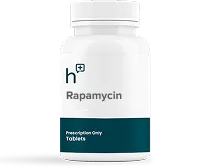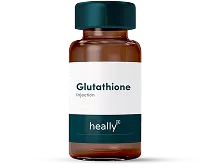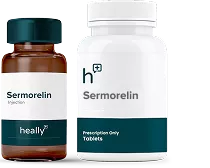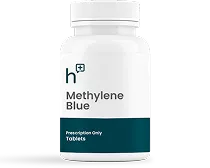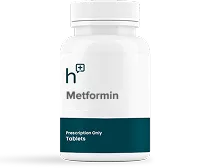Get Sermorelin Therapy Online

Who can benefit from Sermorelin therapy?
Popular Longevity Drugs You Can Get Online
Discover the latest in anti-aging medications.
NAD+
NAD+ is a naturally occurring molecule found in every cell of your body that helps convert food into energy. Think of it as a key worker in your cells' power plants, helping to keep everything running smoothly. As we age, our bodies tend to produce less NAD+, which has made it a focus of aging research. Scientists are studying how this decline in NAD+ levels might be connected to the way our cells change as we get older.
Rapamycin
Rapamycin, initially used as an immunosuppressant, has garnered attention for its ability to delay aging by inhibiting the mTOR pathway, which plays a crucial role in the aging process. Its effectiveness in extending lifespan in various organisms highlights its potential as an anti-aging therapy.
Glutathione
Glutathione is a powerful antioxidant naturally produced in the body that plays a critical role in neutralizing free radicals, supporting immune function, and detoxifying harmful substances. It has been closely linked to cellular health and longevity due to its ability to reduce oxidative stress and inflammation—two key drivers of aging and age-related diseases. Research suggests that enhancing glutathione levels may contribute to improved health span and longevity.
Sermorelin
Sermorelin is a synthetic peptide that stimulates the natural production of growth hormone in the body. It works by interacting with the pituitary gland, the small organ in your brain that controls various hormones. As we age, our natural growth hormone production typically declines, and researchers are studying how compounds like sermorelin might influence this age-related process. Scientists are exploring its relationship to various aspects of aging and cellular health.
Methylene Blue
Methylene blue is a synthetic dye compound that has been studied for its cellular effects. It works by helping the mitochondria - your cells' energy factories - produce energy more efficiently. While traditionally used in laboratory settings, researchers are exploring this compound's relationship to cellular health and energy production. Scientists are particularly interested in studying how it interacts with aging-related cellular processes.
Metformin
Metformin, widely recognized for its diabetes management capabilities, has shown promise in extending lifespan by improving insulin sensitivity and reducing inflammation. Its safety profile and potential anti-aging effects make it a compelling option for those looking to add healthy years to their life.
Each of these medications offers a unique approach to tackling the aging process, promising improved health spans and enhanced quality of life when used under the guidance of a longevity doctor. Explore these options further and consult with a healthcare provider to determine the best course of action for your longevity regimen. You can only get Rapamycin, Metformin, and NAD+ prescriptions currently on Heally.

What to expect with Sermorelin therapy
Schedule AppointmentWhen starting sermorelin therapy, patients often report noticeable improvements within the first few weeks of treatment. While individual sermorelin results vary, many users experience enhanced sleep quality and increased energy levels during the initial month. As treatment progresses, patients may notice improved recovery after exercise and enhanced overall vitality.
Understanding the sermorelin benefits timeline helps set realistic expectations. While some effects like improved sleep may appear relatively quickly, how fast does sermorelin work depends on individual factors. More significant changes in body composition and sermorelin weight loss before and after results typically develop over 3-6 months of consistent therapy. Most patients report feeling their best results when combining treatment with healthy lifestyle habits.

Patient Experiences
Real patient experiences with Sermorelin therapy:


How to get a Sermorelin prescription online
Getting your sermorelin prescription online through Heally is a simple three-step process
Book Consultation




Why consider Sermorelin therapy for overall wellness?

What is the cost of Sermorelin therapy?
- Detailed medical evaluation
- Personalized treatment planning
- Direct Home Delivery
- Follow-up support as needed
- No Membership Fee/Hidden Cost
- Lab Testing Available at Extra Cost
What is Sermorelin?


Sermorelin side effects
While sermorelin side effects are generally mild and temporary, it's important to be aware of potential reactions. Common side effects of sermorelin may include mild injection site reactions, such as redness or slight discomfort. Some patients might experience temporary headaches or mild joint discomfort when starting treatment.
For women specifically, sermorelin for females side effects are similar to those experienced by men. Most sermorelin peptide side effects resolve as your body adjusts to treatment. Any sermorelin long-term side effects should be discussed with your healthcare provider, who can help adjust your treatment plan if needed.

Ready to explore Sermorelin therapy?


How does Sermorelin work?
How does sermorelin work in your body? This sermorelin peptide functions as a biological signal, stimulating your pituitary gland to increase natural growth hormone production. Unlike direct hormone treatments, what does sermorelin do is support your body's own hormone-producing capabilities.
When you take sermorelin growth hormone therapy, it triggers a cascade of natural processes. First, it signals your pituitary gland to release more growth hormone. This increased production then leads to several potential benefits throughout your body:
- Enhanced protein synthesis for muscle growth
- Improved recovery after workouts
- Support for lean muscle development
- Potential assistance with fat metabolism
- Enhanced sleep quality optimization
The sermorelin peptide benefits are most noticeable when combined with proper nutrition and regular exercise. Your body's response to the therapy typically follows your natural circadian rhythm, with peak activity during sleep when most muscle recovery and growth occurs.

How to use Sermorelin safely
- Learn how to inject sermorelin from your healthcare provider
- Follow recommended sermorelin dosage precisely
- Rotate between different sermorelin injection sites
- he best place to inject sermorelin is typically the abdomen
- The best place to inject sermorelin is typically the abdomen
- Store medication properly according to instructions
- Always use clean technique for injections

FAQs
Learn more about sermorelin

With more than 30 years of physician practice in the Obstetrics and Gynecology specialty, Dr. Niles is recognized as a leading authority on the delivery of quality medical care. She has a well-established and respected history of worldwide medical collaboration, research, philanthropy, and distinguished leadership.

